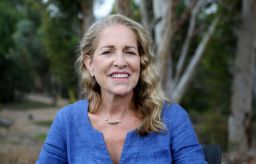Susan Munsey’s mission to help victims of sex trafficking in the US is a personal one.
When she was 15, growing up in Los Angeles, Munsey started dating a man she thought was the real deal.
“I’d never had a boyfriend before. He gave me compliments. He was charming. He took me out to eat,” she recalled. “I was insecure and didn’t have a lot of self-esteem. … And here I had this 24-year-old boyfriend. Wasn’t I something special?”
Then he started abusing her. He forced her to sell her body. Months later, she was arrested for prostitution.

“I really hadn’t talked to anybody about this for probably 30 years, other than my therapist,” Munsey, now 61, said. “I was really afraid that people would judge me. I was very afraid to share that part of my life.”
Decades later, armed with her own survival and years of research and expertise as a clinical social worker, Munsey shared her personal story with a church mentor who also wanted to do something about the sex trafficking problem in San Diego.
The city is among the top 13 highest sex trafficking areas in the country, according to the FBI.
Yet at the time, Munsey found very few programs existed to help victims.
“It just sparked something in me,” she said. “I always knew that God would use that time that I was trafficked in some way. It wasn’t just going to be wasted time.”
In 2009, she founded GenerateHope, a nonprofit that offers a safe place for survivors of sex trafficking to heal and build new lives. The group provides long-term housing, therapy, education and medical care.
“It’s not just about creating safety physically, but psychologically as well,” Munsey said.
Participants attend classes to get caught up on their high school education and prepare for college. They receive individual therapy, and there are five group therapies a week focused on the traumatic experience of being in the sex trade.
Women can stay at GenerateHope’s safe house for up to two years and benefit from a variety of volunteer-led support services, such as equine and art therapy, dance and yoga.
“We really work to help them realize all the skills and capabilities that they have within themselves,” Munsey said.
To date, Munsey says GenerateHope has been a refuge for more than 100 victims – some as young as 18 – women she calls “survivors.”
CNN’s Allie Torgan spoke with Munsey about her work. Below is an edited version of their conversation.
CNN: What led you to start your program?
Susan Munsey: I’m a psychotherapist, and I know the kind of damage that this does to kids, to adults. It really bothered me that there weren’t any programs in San Diego. My vision was to have a home where women could come and find safety – and find themselves.
This is so important to me because I was trafficked. He did the same thing that I see happening to women today. I was physically abused. He broke my jaw. It was going be a one-time thing. And that turned into a couple of months.
I was 16 when I was arrested. I was handcuffed and taken down to jail. It was humiliating. But it gave me enough of an idea about what it was like to be in the life and how degrading that is. And how awful that is for anyone to be in that kind of situation where you’re forced to have sex with strangers and give the money back to this guy who’s supposed to love you.
CNN: Who are the traffickers in the US?
Munsey: Traffickers or pimps can be a lot of different kinds of people. It could be somebody who’s handed down the business, so to speak. It could be an uncle or a dad.
It’s something that gangs have found as a very lucrative business – better than guns or drugs. Because if you get caught in your car with guns or drugs, it’s a bust. You get caught in your car with a girl, he’s already groomed her to not say anything, or to say, “This is my uncle” or “my friend.” Fines are much higher, believe it or not, for guns or drugs than it is for trafficking women and girls.
CNN: Who are the victims you see?
Munsey: Trafficking can hit anybody. It’s throughout our nation. We know that the vast majority are girls. Boys tend, I think, not to report as much. Statistics vary a little bit; it depends on what research you’re looking at. Some will cite girls being trafficked as young as 12. What we’ve seen mostly is that women are trafficked first around 14, 15 years old.
CNN: How do traffickers recruit victims?
Munsey: They’re looking for young, vulnerable women. Much of it’s on the Internet now. The dating websites are a big area where women can be duped. Also, gaming. They’ll pretend to be somebody who’s younger. He may pose as somebody close to this child’s age and develop a friendship.
They’re pretty slick about getting into these kids’ heads – their brains aren’t developed fully, so they don’t really know how to get away from this guy. They’re afraid to tell their parents. They certainly aren’t going to call the police. So, it’s really a slippery slope.
CNN: What is your advice to families?
Munsey: I would want people to be aware that traffickers are going to go to the places where young people hang out. Places like malls, coffee shops, public transportation, the internet, schools even. They will sometimes send somebody who looks young enough into a school to recruit.
Use caution with dating websites. It can happen to someone in college. And it’s so important that parents help protect their kids from this internet danger. I encourage parents to know their kids’ passwords. To check frequently what their kids are doing. Keep computers in a common area, not off in bedrooms.
It’s not necessarily that your kids can’t be trusted, but that these guys can’t be trusted.
Want to get involved? Check out the GenerateHope website and see how to help.
To donate to GenerateHope, click the CrowdRise widget below.

















